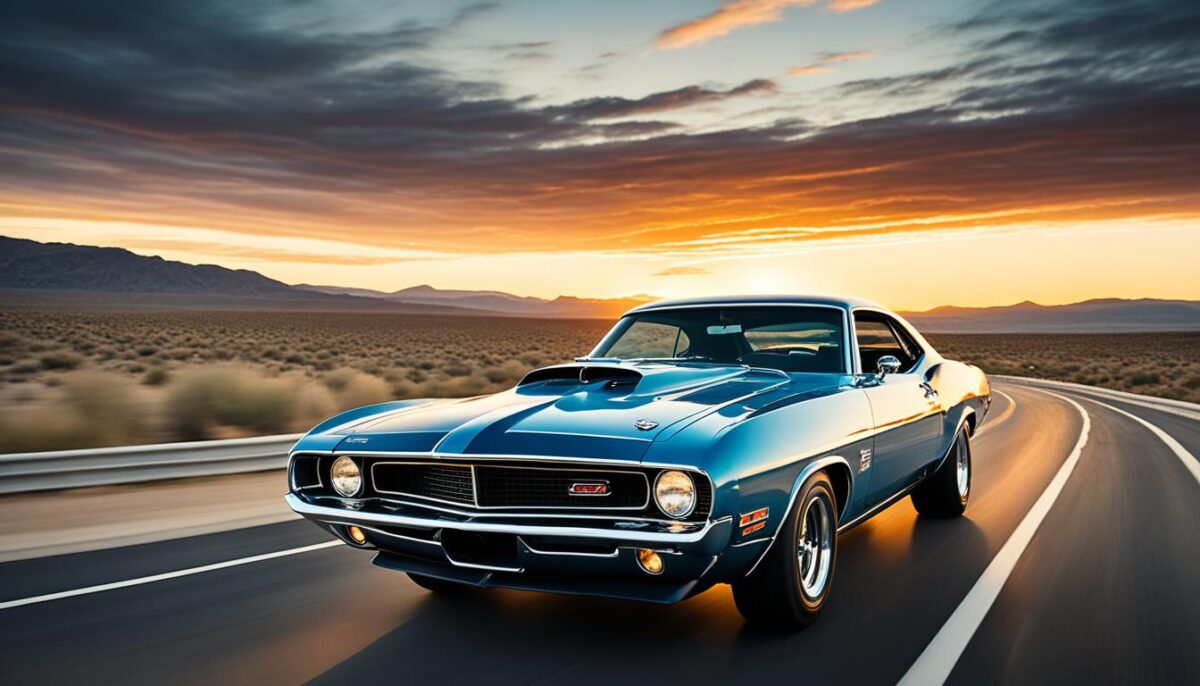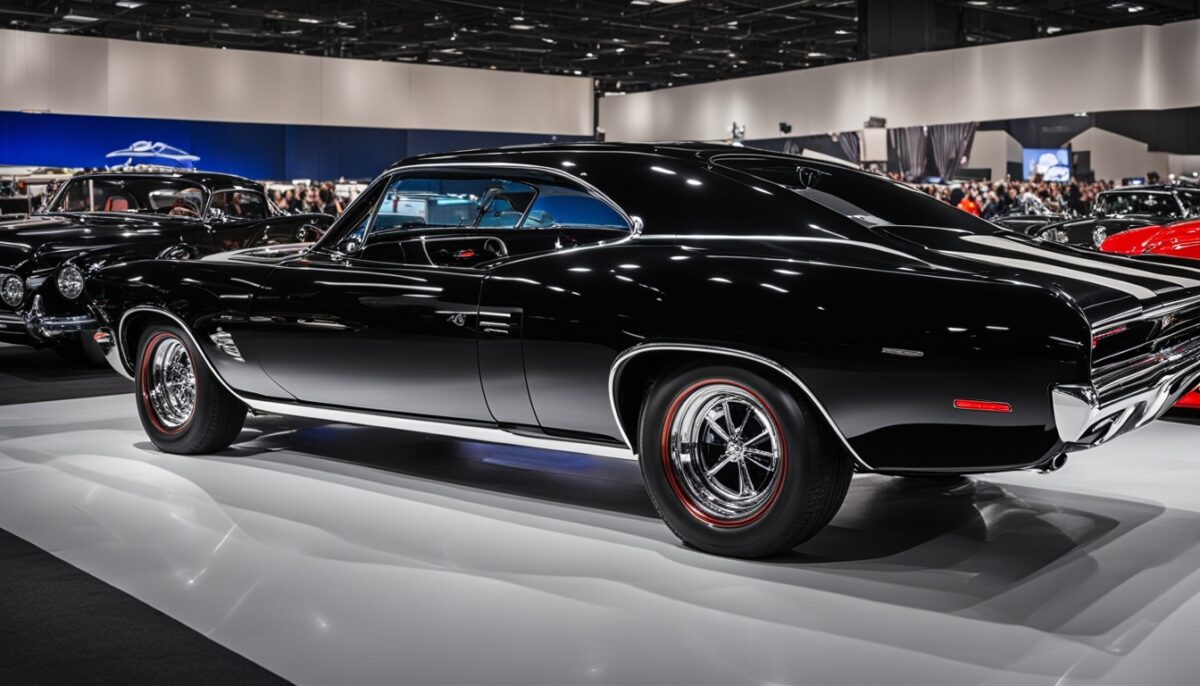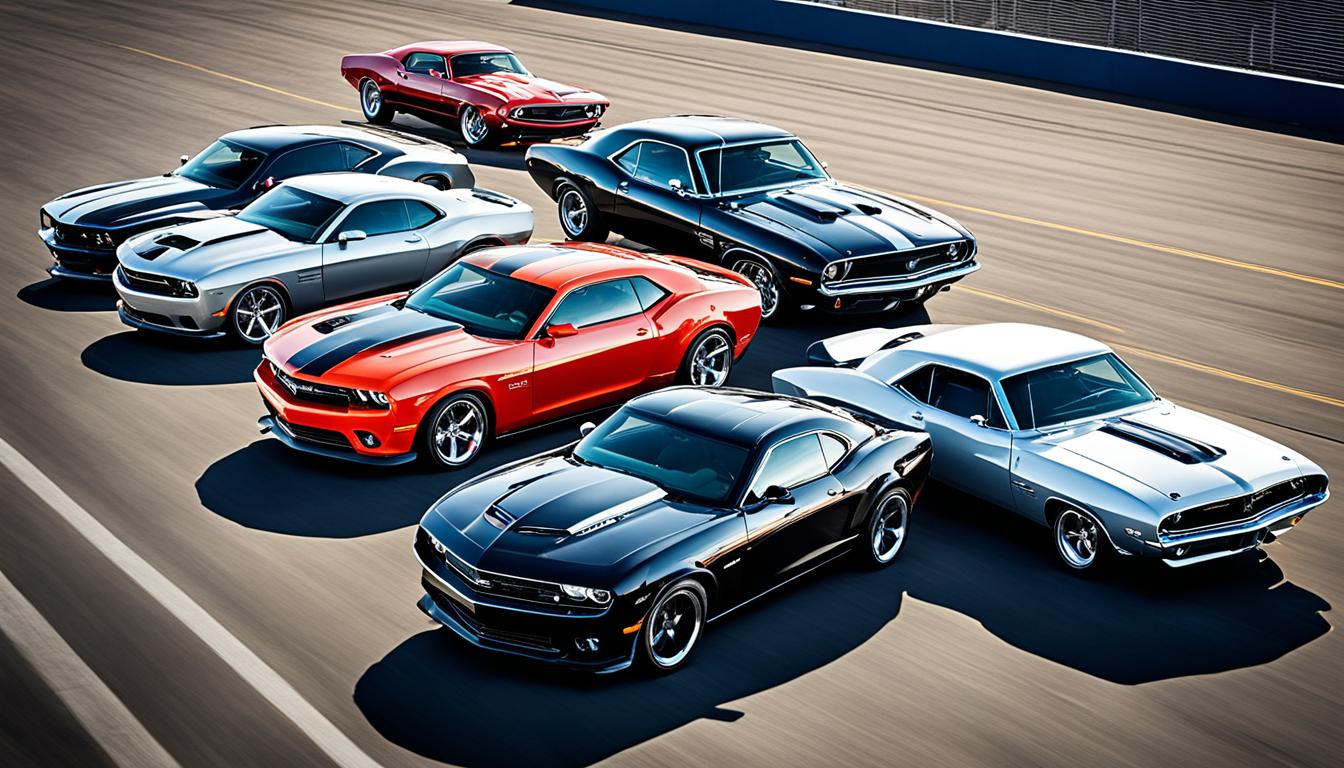Muscle Cars have become a hallmark of power, performance, and undeniable presence on the road. Their roaring engines and aggressive designs not only captivate automotive enthusiasts but also pave their way onto the auction block, where they often command staggering prices. In this article, we will embark on a thrilling exploration of the fascinating world of Muscle Cars, examining their history, evolution, and cultural significance. Together, we can appreciate their lasting impact on automotive culture and the reasons behind their continued allure and prestige.
The Allure of Muscle Cars
The journey of Muscle Cars is a fascinating tale rooted in American automotive history. These vehicles not only exemplify high performance but also embody a spirit and culture that resonates with car enthusiasts around the world. We witness how Muscle Car history reflects pivotal moments in the automotive evolution, capturing our hearts and imaginations through raw power and iconic designs.
History and Evolution
Muscle Cars emerged prominently during the mid-20th century, offering an exhilarating experience that showcased the capabilities of American engineering. Iconic vehicles from brands like Pontiac, Ford, and Chevrolet introduced powerful V8 engines and lightweight frames, significantly transforming the landscape of vintage cars. This evolution marked a shift in the automotive industry, where speed and performance became paramount.
- The Pontiac GTO, often hailed as the catalyst for the muscle car movement, debuted in 1964.
- Subsequent models emphasized innovation, incorporating advanced technology and design.
- During the 1960s and 70s, these cars became synonymous with freedom and rebellion, mirroring the cultural dynamics of the era.
Cultural Impact and Icon Status
Muscle Car culture extends beyond mere mechanics; these vehicles occupy a cherished space in popular culture. They have been celebrated in films, music, and art, solidifying their status as automobile icons. The Ford Mustang and Chevrolet Camaro are emblematic of a lifestyle characterized by speed, freedom, and nostalgia, forming a profound connection with enthusiasts.
“Muscle Cars are not just machines; they represent an aspiration that resonates deeply with many.”
Key moments in film, such as the features in “Bullitt” and the “Fast & Furious” franchise, illustrate how these vehicles have woven themselves into our collective memory. This cultural significance ensures the Muscle Car remains at the forefront of our automotive desires, maintaining its automobile icon status amongst vintage cars and new enthusiasts alike.

Top Muscle Cars on the Auction Block
As we explore the auction scene for muscle cars, we uncover both classic favorites and rising stars. The allure of these vehicles captivates enthusiasts and collectors alike. Let’s delve into the top contenders dominating the auction landscape today.
Classic Favorites
Among iconic models, the Ford Mustang, Chevrolet Camaro, and Dodge Charger emerge as essential players. These classic muscle cars not only symbolize a golden era of automotive history but continue to achieve remarkable auction highlights. The 1969 Chevrolet Camaro and the 1970 Dodge Charger often command record prices, securing their status as highly sought-after collectible cars. Their rarity, impeccable condition, and historical significance greatly contribute to their value in the auction market.
The Rising Stars
Turning our attention to modern muscle cars, we identify models that increasingly capture the admiration of collectors. Vehicles like the Dodge Challenger and Ford Mustang GT500 are gaining traction, becoming the focus of emerging auction trends. The performance advancements and modern designs resonate with younger collectors, blending nostalgia with cutting-edge technology. According to market analysis, these modern iterations show potential to one day join the ranks of future classics.
As the muscle car landscape evolves, the auction block remains an exciting venue to witness the transformation of iconic vehicles into coveted investments.
| Model | Year | Auction Price | Type | Significance |
|---|---|---|---|---|
| Chevrolet Camaro | 1969 | $1,200,000 | Classic Muscle Car | Record Auction Price |
| Dodge Charger | 1970 | $900,000 | Classic Muscle Car | Highly Collectible |
| Dodge Challenger | 2021 | $250,000 | Modern Muscle Car | Gaining Popularity |
| Ford Mustang GT500 | 2020 | $350,000 | Modern Muscle Car | Future Classic Potential |
Muscle Cars: Investment and Value Trends
Investing in muscle cars offers exciting opportunities shaped by various influences. As we explore Auction Price Factors, it becomes clear that understanding the underlying dynamics enhances our decisions in this vibrant market.
Factors Influencing Auction Prices
Several key elements play significant roles in determining the value of muscle cars. Among these, the following factors stand out:
- Supply and demand dynamics of specific models.
- The authenticity and historical significance of the car.
- The overall condition, including maintenance history and rarity.
Valuation Trends can dramatically shift based on these aspects, influencing market behavior and investment potential in collectible cars. For example, a well-preserved classic belonging to a notable owner or exhibiting unique modifications tends to fetch higher auction prices.
Future Predictions in Muscle Car Valuation
Looking ahead, we find intriguing Muscle Car Market Predictions. The ongoing trend in electric vehicle technologies may reshape consumer preferences and alter traditional valuations of muscle cars. As the automotive industry transforms, we anticipate a blend of classic aesthetics with modern innovations.
Moreover, Future Value Trends suggest that muscle cars retaining originality may appreciate significantly in the collector’s market. As newer generations of car enthusiasts emerge, their desire to connect with the past could drive up demand for exceptional models.
| Model | Current Auction Price | Predicted Future Value |
|---|---|---|
| Ford Mustang GT (1968) | $45,000 | $70,000 |
| Chevrolet Camaro Z/28 (1970) | $50,000 | $80,000 |
| Plymouth Barracuda (1970) | $55,000 | $85,000 |
| Dodge Charger (1970) | $60,000 | $90,000 |

Experiencing Muscle Car Auctions
Participating in muscle car auctions is truly an exhilarating experience that we’re all eager to embrace. The atmosphere buzzes with energy and excitement as collectors and enthusiasts gather to engage in the lively bidding process. For those considering attending their first auction, preparation is key. Understanding auction terms, knowing how to assess a car’s value, and arriving ready to dive into the action can transform the day into a memorable adventure.
Renowned auction houses like Mecum Auctions and RM Sotheby’s specialize in selling muscle cars, setting the stage for some of the most thrilling auction experiences. With a variety of iconic vehicles on display, the excitement escalates as bidders raise their paddles, competing for their dream machines. Each auction provides a unique opportunity to witness rare cars in person while engaging with fellow enthusiasts who share our passion for these automotive masterpieces.
In preparing for buying muscle cars at auctions, we can gain valuable insights from past experiences. By taking the time to research vehicles of interest, understanding their historical significance, and setting a reliable budget, we can navigate the auction floor with confidence. Let’s embrace the journey and fully enjoy the exhilarating world of muscle car auctions, where every bid could lead us closer to owning a piece of automotive history.


No Responses